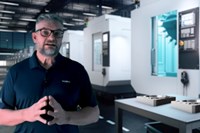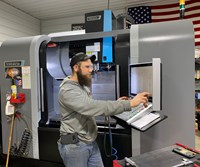Rotary Table-Equipped Machining Centers Add Value For Investment Caster
A specialist in investment castings has invested in making those castings more valuable. Hartford, Wisconsin-based Signicast Corporation recently strengthened its capacity to perform machining on castings in-house so customers can receive a more finished product.
A specialist in investment castings has invested in making those castings more valuable. Hartford, Wisconsin-based Signicast Corporation recently strengthened its capacity to perform machining on castings in-house so customers can receive a more finished product.
Customer demand for shorter leadtimes was a catalyst in the decision to invest in more machining. The value of offering customers a one-stop shop contributed to the shift as well.
“Just-in-time types of shipments were becoming more commonplace, and a number of our customers were searching for suppliers that performed all value-added operations—those that offered the complete component,” says Bob Schuemann, executive vice president at Signicast.
Serving more than 300 customers, Signicast creates investment castings for a major motorcycle manufacturer. It also produces castings for other industries, with manufacturers of lawn care equipment and hand tools among the company’s clientele. The wide variety of part numbers makes it even more imperative to execute operations such as turning, milling, reaming, honing, drilling, tapping and surface grinding operations in an efficient manner. Manual setups, which often required most of a day to complete, were cumbersome and unappealing.
In 2002, the company created a fifth plant dedicated to machining. While visiting a tool show, Jim Okonek, toolroom/machining manager at Signicast, evaluated various machine tool options in search of a suitable machining center for the additional plant. Research in hand, he met with various integrators and decided on a Brother TC-32A from Yamazen, Inc. (Schaumburg, Illinois). When asked to explain the logic behind the purchase, Mr. Okonek indicated that although price was a consideration, his primary focus was on machining capabilities.
“I concluded that the Brother TC-32A was the best fit for us because of its milling, drilling and tapping capabilities,” he explains. “Our operations are continuous flow, meaning that production is carried out on an as-you-need-it basis. With no backlog, downtime simply isn’t an option.”
Mr. Okonek also cites the machine’s high speed capabilities as a determining factor. The medium-duty machine has been particularly useful in accomplishing the company’s high volume of close-tolerance work, adds Mr. Schuemann. Since the initial purchase, Signicast has added 13 same-model machining centers, for a total of 14 TC-32As.
“This transition has enabled us to send products out more quickly,” observes Mr. Okonek. “There has been a reduction of 4, 6, 8 or 10 weeks in delivery time in many instances. We can deliver a product—from wax to its finished form—in approximately 10 days, a process that previously required weeks or even months.”
Working alongside integrators, Mr. Okonek weighed the pros and cons of numerous rotary table models to be used concurrently with the machining center. Ultimately, he selected Nikken CNC Z 180 high speed, single-axis rotary tables supplied by Lyndex-Nikken (Mundelein, Illinois). Mr. Okonek says his choice hinged upon the fact that these particular tables communicated well with the machining center. Consequently, these products assisted the company in upgrading its complete component plant from manual to automation, a move that boosted production capabilities and improved leadtimes for its customers.
Company: Signicast Corporation
Problem: Manual setups were cumbersome and time-consuming
Solution: CNC Z 180 rotary tables from Lyndex Nikken
Results: Substantial time savings related to setup
“With one gripping rather than multiple setups, we can access multiple sides of a workpiece to yield a finished part,” explains Mr. Okonek. “Previously, short-run setups might require a full day. However, the transition to automation has reduced setup time to a maximum of 15 minutes. Typically a turnkey component, including machining and heat treatment, can be produced in 10 days.”
Lyndex-Nikken offers single- and dual-axis rotary tables that feature a carbide worm system. Incorporating a carbide worm screw and ion-nitrided worm wheel, rather than a conventional bronze or bronze alloy actuation mechanism, the system’s design is conducive to reducing friction and wear, says the manufacturer. The worm screw consists of a less brittle V-grade form of carbide, while the worm gear is ion-nitrided to a depth of 0.1 mm and an external surface hardness of 68 Rc. These properties, as well as a steel way hardened to 58 Rc to 60 Rc, all contribute to enhancing system rigidity and longevity, says the manufacturer. The rotary tables are said to promote productivity through rotations reaching 44.4 rpm and tilt-axis rotation speeds approaching 33.3 rpm.
As an added benefit, Signicast has been able to incorporate Lyndex-Nikken’s toolholders and collets.
“When used in conjunction, the toolholders, rotary tables and machining centers work well together,” says Mr. Okonek. “We have also noticed that the collets have steep angles for tight holding.”
Mr. Schuemann also mentions several other benefits experienced by the customers. “Because machining has been brought in-house, customers have the luxury of dealing with only one person instead of having to contact the plating house and so on,” he says. “This means that we assume total responsibility for the finished product, and customers need only deal with one go-to person.” In other words, in addition to reducing leadtime for customers, the machining capabilities can reduce their phone time as well.
Read Next
The Cut Scene: The Finer Details of Large-Format Machining
Small details and features can have an outsized impact on large parts, such as Barbco’s collapsible utility drill head.
Read More3 Mistakes That Cause CNC Programs to Fail
Despite enhancements to manufacturing technology, there are still issues today that can cause programs to fail. These failures can cause lost time, scrapped parts, damaged machines and even injured operators.
Read More






.png;maxWidth=300;quality=90)











